非谓语动词口诀(整理版)
非谓语动词做题口诀
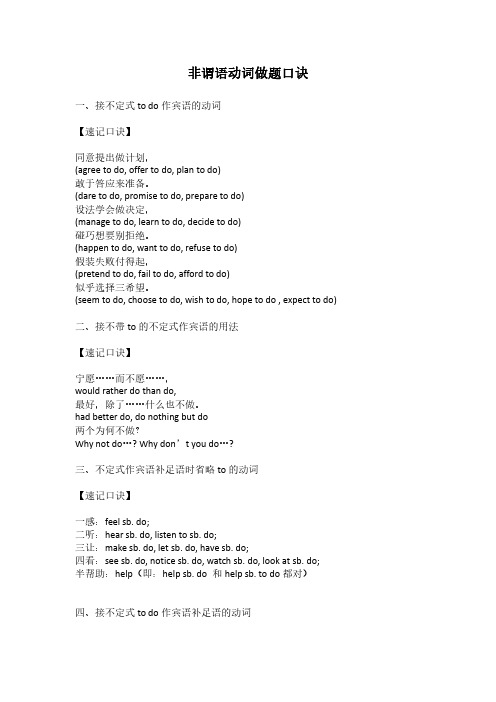
非谓语动词做题口诀一、接不定式to do作宾语的动词【速记口诀】同意提出做计划,(agree to do,offer to do,plan to do)敢于答应来准备。
(dare to do,promise to do,prepare to do)设法学会做决定,(manage to do,learn to do,decide to do)碰巧想要别拒绝。
(happen to do,want to do,refuse to do)假装失败付得起,(pretend to do,fail to do,afford to do)似乎选择三希望。
(seem to do,choose to do,wish to do,hope to do,expect to do)二、接不带to的不定式作宾语的用法【速记口诀】宁愿……而不愿……,would rather do than do,最好,除了……什么也不做。
had better do,do nothing but do两个为何不做?Why not do…?Why don’t you do…?三、不定式作宾语补足语时省略to的动词【速记口诀】一感:feel sb.do;二听:hear sb.do,listen to sb.do;三让:make sb.do,let sb.do,have sb.do;四看:see sb.do,notice sb.do,watch sb.do,look at sb.do;半帮助:help(即:help sb.do和help sb.to do都对)四、接不定式to do作宾语补足语的动词【速记口诀】想要期待与希望,want/would like sb.to do,expect sb.to do,wish sb.to do需要鼓励与允许,require sb.to do,encourage sb.to do,allow sb.to do要求命令与告诉,ask sb.to do,order sb.to do,tell sb.to do引导邀请要教授。
非谓语动词口诀(速记重点)
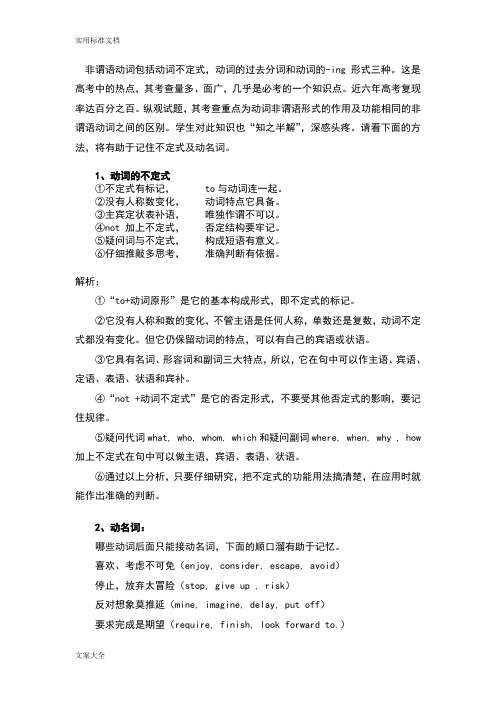
非谓语动词包括动词不定式,动词的过去分词和动词的-ing形式三种。
这是高考中的热点,其考查量多、面广,几乎是必考的一个知识点。
近六年高考复现率达百分之百。
纵观试题,其考查重点为动词非谓语形式的作用及功能相同的非谓语动词之间的区别。
学生对此知识也“知之半解”,深感头疼。
请看下面的方法,将有助于记住不定式及动名词。
1、动词的不定式①不定式有标记,to与动词连一起。
②没有人称数变化,动词特点它具备。
③主宾定状表补语,唯独作谓不可以。
④not 加上不定式,否定结构要牢记。
⑤疑问词与不定式,构成短语有意义。
⑥仔细推敲多思考,准确判断有依据。
解析:①“to+动词原形”是它的基本构成形式,即不定式的标记。
②它没有人称和数的变化,不管主语是任何人称,单数还是复数,动词不定式都没有变化。
但它仍保留动词的特点,可以有自己的宾语或状语。
③它具有名词、形容词和副词三大特点,所以,它在句中可以作主语、宾语、定语、表语、状语和宾补。
④“not +动词不定式”是它的否定形式,不要受其他否定式的影响,要记住规律。
⑤疑问代词what, who, whom, which和疑问副词where, when, why , how 加上不定式在句中可以做主语,宾语、表语、状语。
⑥通过以上分析,只要仔细研究,把不定式的功能用法搞清楚,在应用时就能作出准确的判断。
2、动名词:哪些动词后面只能接动名词,下面的顺口溜有助于记忆。
喜欢、考虑不可免(enjoy, consider, escape, avoid)停止,放弃太冒险(stop, give up , risk)反对想象莫推延(mine, imagine, delay, put off)要求完成是期望(require, finish, look forward to.)建议继续勤*练(suggest, go on, practise)不禁原谅要坚持(can’t help, excuse , insist on)继续注意使成功(keep on, mind, succeed in)1. Everyone in our class was working hard and doing what we could _______a good college.A. enterB. to enterC. enteringD. entered【陷阱】容易误选A。
英语非谓语口诀
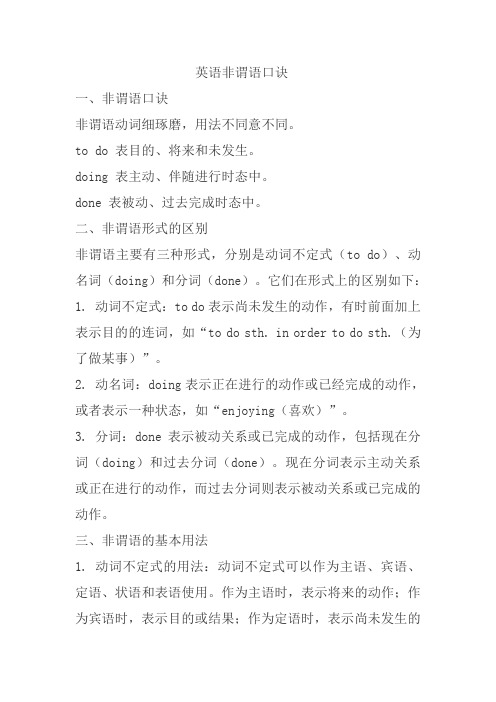
英语非谓语口诀
一、非谓语口诀
非谓语动词细琢磨,用法不同意不同。
to do 表目的、将来和未发生。
doing 表主动、伴随进行时态中。
done 表被动、过去完成时态中。
二、非谓语形式的区别
非谓语主要有三种形式,分别是动词不定式(to do)、动名词(doing)和分词(done)。
它们在形式上的区别如下:1. 动词不定式:to do表示尚未发生的动作,有时前面加上表示目的的连词,如“to do sth. in order to do sth.(为了做某事)”。
2. 动名词:doing表示正在进行的动作或已经完成的动作,或者表示一种状态,如“enjoying(喜欢)”。
3. 分词:done表示被动关系或已完成的动作,包括现在分词(doing)和过去分词(done)。
现在分词表示主动关系或正在进行的动作,而过去分词则表示被动关系或已完成的动作。
三、非谓语的基本用法
1. 动词不定式的用法:动词不定式可以作为主语、宾语、定语、状语和表语使用。
作为主语时,表示将来的动作;作为宾语时,表示目的或结果;作为定语时,表示尚未发生的
动作;作为状语时,表示目的或结果;作为表语时,表示主语的意图或愿望。
2. 动名词的用法:动名词可以作为主语、宾语、定语和表语使用。
作为主语时,表示泛指或抽象动作;作为宾语时,表示正在进行的动作或状态;作为定语时,表示正在进行的动作或状态;作为表语时,表示主语的性质或特征。
3. 分词的用法:分词可以作为定语、状语和表语使用。
作为定语时,表示被动关系或已完成的动作;作为状语时,表示正在进行的动作或状态;作为表语时,表示主语的性质或特征。
非谓语动词口诀
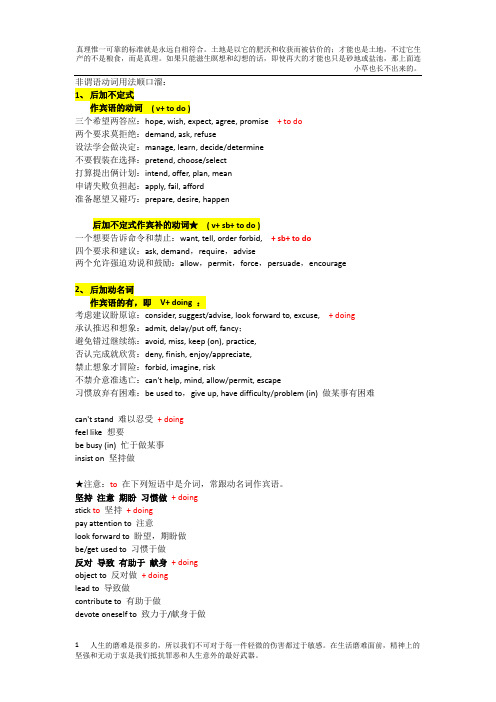
非谓语动词用法顺口溜:1、后加不定式作宾语的动词( v+ to do )三个希望两答应:hope, wish, expect, agree, promise + to do两个要求莫拒绝:demand, ask, refuse设法学会做决定:manage, learn, decide/determine不要假装在选择:pretend, choose/select打算提出俩计划:intend, offer, plan, mean申请失败负担起:apply, fail, afford准备愿望又碰巧:prepare, desire, happen后加不定式作宾补的动词★( v+ sb+ to do )一个想要告诉命令和禁止:want, tell, order forbid, + sb+ to do四个要求和建议:ask, demand,require,advise两个允许强迫劝说和鼓励:allow,permit,force,persuade,encourage2、后加动名词作宾语的有,即V+ doing :考虑建议盼原谅:consider, suggest/advise, look forward to, excuse, + doing承认推迟和想象:admit, delay/put off, fancy;避免错过继续练:avoid, miss, keep (on), practice,否认完成就欣赏:deny, finish, enjoy/appreciate,禁止想象才冒险:forbid, imagine, risk不禁介意准逃亡:can't help, mind, allow/permit, escape习惯放弃有困难:be used to,give up, have difficulty/problem (in) 做某事有困难can't stand 难以忍受+ doingfeel like 想要be busy (in) 忙于做某事insist on 坚持做★注意:to在下列短语中是介词,常跟动名词作宾语。
英语语法非谓语动词口诀整理版
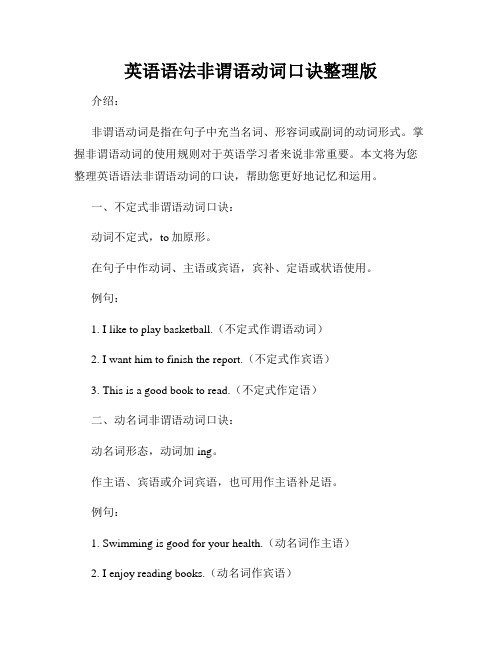
英语语法非谓语动词口诀整理版介绍:非谓语动词是指在句子中充当名词、形容词或副词的动词形式。
掌握非谓语动词的使用规则对于英语学习者来说非常重要。
本文将为您整理英语语法非谓语动词的口诀,帮助您更好地记忆和运用。
一、不定式非谓语动词口诀:动词不定式,to加原形。
在句子中作动词、主语或宾语,宾补、定语或状语使用。
例句:1. I like to play basketball.(不定式作谓语动词)2. I want him to finish the report.(不定式作宾语)3. This is a good book to read.(不定式作定语)二、动名词非谓语动词口诀:动名词形态,动词加ing。
作主语、宾语或介词宾语,也可用作主语补足语。
例句:1. Swimming is good for your health.(动名词作主语)2. I enjoy reading books.(动名词作宾语)3. She is interested in learning French.(动名词作介词宾语)三、过去分词非谓语动词口诀:过去分词表被动,辅助动词辅助上。
常与情态动词连用,表示完成或被动。
例句:1. The book was written by Mark Twain.(过去分词作谓语动词)2. The window was broken by the ball.(过去分词作宾语)四、不定式与动名词非谓语动词口诀:非谓语动词,变换形态。
动词不定式to加原形,动名词改成ing。
例句:1. I plan to go shopping tomorrow.(不定式作谓语动词)2. I remember seeing him at the party.(动名词作宾语)五、非谓语动词口诀:非谓语动词基本定,可做主语宾语定。
动名词表示活动,过去分词表示被动。
例句:1. To learn a new language is not easy.(不定式作主语)2. The movie was interesting.(过去分词作宾语)总结:掌握非谓语动词的使用是学习英语的重要一步。
非谓语动词口诀(大全)
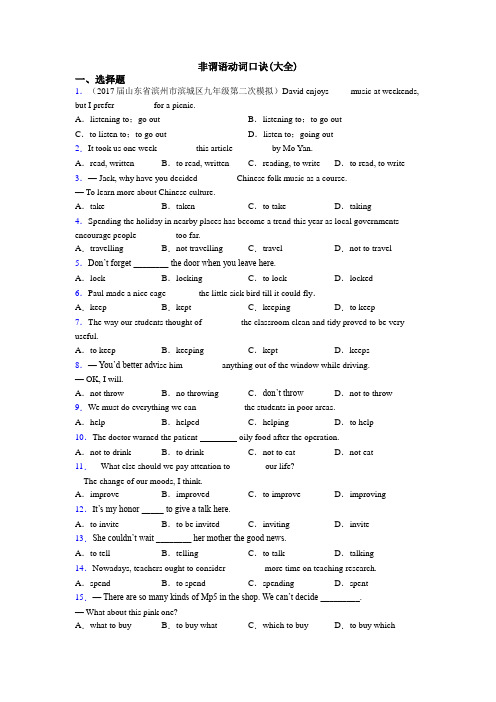
非谓语动词口诀(大全)一、选择题1.(2017届山东省滨州市滨城区九年级第二次模拟)David enjoys ____ music at weekends, but I prefer ________ for a picnic.A.listening to;go out B.listening to;to go outC.to listen to;to go out D.listen to;going out2.It took us one week ________ this article ________ by Mo Yan.A.read, written B.to read, written C.reading, to write D.to read, to write 3.— Jack, why have you decided ________ Chinese folk music as a course.— To learn more about Chinese culture.A.take B.taken C.to take D.taking 4.Spending the holiday in nearby places has become a trend this year as local governments encourage people ________ too far.A.travelling B.not travelling C.travel D.not to travel 5.Don’t forget ________ the door when you leave here.A.lock B.locking C.to lock D.locked6.Paul made a nice cage _______the little sick bird till it could fly.A.keep B.kept C.keeping D.to keep7.The way our students thought of ________ the classroom clean and tidy proved to be very useful.A.to keep B.keeping C.kept D.keeps 8.—You’d better advi se him ________ anything out of the window while driving.— OK, I will.A.not throw B.no throwing C.don’t throw D.not to throw 9.We must do everything we can __________ the students in poor areas.A.help B.helped C.helping D.to help10.The doctor warned the patient oily food after the operation.A.not to drink B.to drink C.not to eat D.not eat11.---What else should we pay attention to _______ our life?---The change of our moods, I think.A.improve B.improved C.to improve D.improving12.I t’s my honor _____ to give a talk here.A.to invite B.to be invited C.inviting D.invite13.She couldn’t wait ________ her mother the good news.A.to tell B.telling C.to talk D.talking 14.Nowadays, teachers ought to consider ________ more time on teaching research. A.spend B.to spend C.spending D.spent 15.—There are so many kinds of Mp5 in the shop. We can’t decide _________.— What about this pink one?A.what to buy B.to buy what C.which to buy D.to buy which16.—Were you born in Baiyin City?—No, I wasn’t. But I have been used ________ in the city since I moved here ten years ago. A.live B.to live C.living D.to living 17.My uncle made up his mind to devote his life pollution happily.A.to prevent; to live B.to prevent; from livingC.to preventing; to live D.to preventing; from living18.—To keep the students safe on their way to school, we have taken more action.— That sounds great. We should do what we can __________ the school bus accident.A.to prevent B.prevent C.to preventing D.preventing 19.(2016•盐城市)We must do everything we can ______waste water from running into rivers . A.prevent B.prevented C.preventing D.to prevent 20.—Do you often hear Lucy ________in her room?—Yes, listen! Now we can hear her ________ in her room.A.sing; sing B.singing; singing C.singing; sing D.sing; singing 21.He tried to make himself ________ by his students, but he failed.A.understand B.understoodC.understands D.understanding22.— Listen! Can you hear something?— Yeah, it could be some children outside.A.were playing B.playingC.to play D.play23.My watch doesn’t work. I must have it ________.A.Repairing B.to repair C.repair D.repaired 24.—________ twice, the cat refused to move near to the table unless the dog was away. A.Being bitten B.Bitten C.Having bitten D.To be bitten 25.My younger sister wants to get her ears ________ after graduation.A.pierced B.pierce C.piercing D.to pierce26.-Don’t you think your hair is too long?-Yes. I am going to have it ________ soon.A.cut B.cuts C.cutting D.to cut 27.—My eyesight is getting worse these days. I'd like to have my eyes________. —Perhaps you should consider ________the time on the computer.A.checked; reducing B.to check; reducingC.checked; to reduce D.checking; to reduce28.The music ________by Tan Dun sounds________.A.was written; amazing B.written; amazedC.was written; amazed D.written; amazing29.A 32-year-old delivery driver ________ Gao Zhixiao was still working as the virus spread across China.A.called B.is called C.calls D.was called 30.Our parents won't allow us _____ in the river alone.A.swimB.to swimC.swimmingD.swam31.—Doctor! I can’t fall at night.—Don’t worry! You are too stressed. Just be relaxed and take some pills, then you’ll be better. A.sleepy; asleep B.asleep; sleepingC.sleep; sleep D.asleep, sleepy32.Gina is the only girl ______ a coat.A.who wear B.who wearing C.wearing D.wears33.What a terrible thing! There is a ________ dog ________ on the ground.A.die, lie B.dead, lying C.death, lay D.dying, lie 34.Seeing their teacher _______ into the classroom, they stopped _______ at once.A.walk; telling B.entering; to speak C.enter; to tell D.walking; talking 35.With a lot of students about too much homework, our teachers have tried some ways to solve this problem.A.complain B.complaining C.complained D.to complain 36.Mr. Grea found Tom a novel in class when he came in.A.is reading B.reading C.read D.to read37.---Is Jack in the next room ?---It’s hard to say. But I heard him _____ loudly wh en I passed by just now.A.speak B.to speak C.spoken D.speaking 38.When I got back home I saw a note on the door ____ “Sorry to miss you; will call later.”A.say B.says C.to say D.saying39.________with his flat, mine looks__________ new.A.Compared; as good as B.To compare; as well asC.Compared; as well as D.To compare; as good as40.The film _______ real-life events ________ by Li An. It’s moving.A.based upon, directed B.based upon, was directedC.was based upon, directed D.was based upon, was directed41.Mr Hu was prevented ____ the meeting by a bad cold yesterday.A.attended B.attending C.attend D.to attend42.I would rather spend time ______ at home than ______ out with you.A.staying; go B.to stay; to go C.staying; to go D.to stay; go43.—Nowadays, many young people get used to________ late every day.—Exactly. But that’s not a good habit.A.stay up B.staying up C.stay out D.staying out44._______ up sales, many international companies plan to set up online shops.A.Push B.To push C.Pushing D.Having pushed 45.I prefer _________ some shopping to ________ camping since the weather isn’t lovely. A.do; going B.doing; go C.do; go D.doing; going 46.—What happened to Lucy? I saw her _______ in her seat just now.—She failed in the f inal exam. Let’s go to cheer her up.A.crying B.to cry C.cried D.to be crying 47.Paul is really considering________himself to________ those children in the earthquake-hit area.A.to devote, teaching B.devoting, teaching C.devoting, teach D.to devote, teach 48.—At weekends, my parents often go cycling with me around the Fishmouth Wetland Park.—That's great! But my parents are too busy ________ operations to spare me any time.A.to do B.done C.doing D.do49.When you travel abroad, you can hardly avoid products made in China.A.to buy B.buy C.buying D.be bought 50.—Excuse me, can you explain the reason to me again?—Sorry, I know what I want to say but I have difficulty ______ myself clearly.A.express B.to express C.expressing D.to be expressed 51.I like because it makes us know ourselves better and know more about the world. A.reading B.cooking C.swimming D.dancing52.—Do you mind beside you, sir?— . I alone to enjoy the music.A.my sitting; Better not; used to sitB.my to sit; Of course not; am used to sittingC.me sitting; I’m sorry but I do; have been used to sittingD.me to sit; Never mind; was used to sitting53.The girl is often seen ____in the art room.A.practice drawing B.practised drawingC.to practice drawing D.practice to draw54._____ a GPS will make _____ easier for you to visit a strange place.A.Take; it B.To take; that C.Taking; it D.Take; that 55.We should encourage our students _____ hard instead of ____ too much time playing games. A.work; spend B.to work; spendC.work; spending D.to work; spending56.He made up his mind to devote his life pollution happily.A.to prevent, to live B.to prevent, from livingC.to preventing, to live D.to preventing, from living57.---It is selfless ______ the doctor to devote all the time he had ________ for the patients.--I think so, they are so great.A.for; to care B.of; to care C.of; to caring D.for; to caring58.—Anyone shouldn’t _________ use fire outdoors.—Yeah, and we should pay attention to ________ our forests and grasslands.A.be allowed to; protect B.allow to; protectingC.be allowed to; protecting D.allow to; protected59.— Would you mind ________ in the hall?—Of course not.A.smoked B.don't smoke C.not smoking D.not to smoke 60.People are advised to avoid ________ their eyes, nose, and mouth with unwashed hands. A.touch B.touched C.to touch D.touching【参考答案】一、选择题1.B解析:B【详解】句意:在周末David喜欢听音乐,但是我更喜欢外出野餐。
非谓语动词口诀(整理版)
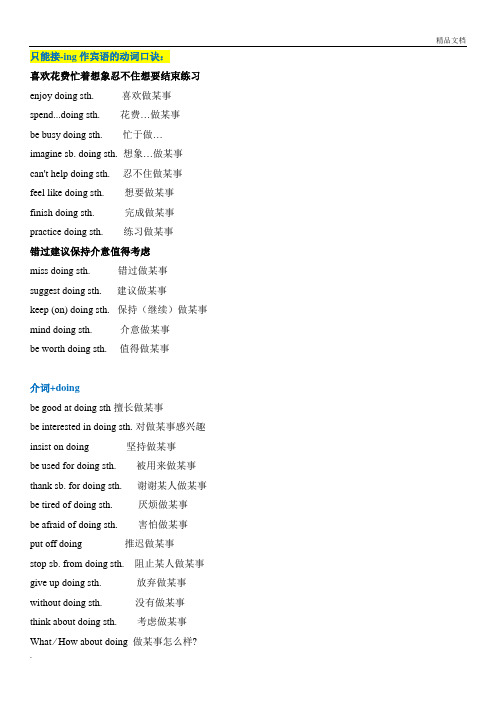
只能接-ing作宾语的动词口诀:喜欢花费忙着想象忍不住想要结束练习enjoy doing sth. 喜欢做某事spend...doing sth. 花费…做某事be busy doing sth. 忙于做…imagine sb. doing sth. 想象…做某事can't help doing sth. 忍不住做某事feel like doing sth. 想要做某事finish doing sth. 完成做某事practice doing sth. 练习做某事错过建议保持介意值得考虑miss doing sth. 错过做某事suggest doing sth. 建议做某事keep (on) doing sth. 保持(继续)做某事mind doing sth. 介意做某事be worth doing sth. 值得做某事介词+doingbe good at doing sth擅长做某事be interested in doing sth. 对做某事感兴趣insist on doing 坚持做某事be used for doing sth. 被用来做某事thank sb. for doing sth. 谢谢某人做某事be tired of doing sth. 厌烦做某事be afraid of doing sth. 害怕做某事put off doing 推迟做某事stop sb. from doing sth. 阻止某人做某事give up doing sth. 放弃做某事without doing sth. 没有做某事think about doing sth. 考虑做某事What ∕ How about doing 做某事怎么样?此to 非彼tolook forward to doing sth. (盼望)pay attention to doing sth. (注意)be used to doing sth. (习惯于)prefer doing sth to doing sth.(更喜欢)devote to doing sth(致力于)make a contribution to doing (做贡献)只能接不定式作宾语的动词口诀:决定想做计划需要同意,能做被用来做的事decide to do sth. 决定做某事want ∕ would like to do sth. 想做某事plan to do sth. 计划做某need to do sth. 需要做某事agree to do sth. 同意做某事afford to do 能做某事be used to do 被用来做迫不及待下决心做过去常常未能做的事被用来做can’t wait to do 迫不及待地要做某事make up one’s mind to do 下决心做某事used to do 过去常常做某事fail to do 未能做某事接不定式作宾语补足语的动词口诀:请求与命令ask sb. to do sth. 请求某人做某事tell sb. to do sth. 命令某人做某事想要邀请期待鼓励与建议want sb. to do sth. 想要某人做某事invite sb. to do sth. 邀请某人做某事expect sb. to do sth. 期待某人做某事encourage sb. to do sth. 鼓励某人做某事advise sb. to do sth. 建议某人做某事答应告诫允许提醒和帮助promise sb. to do 答应某人做某事warn sb. not to do sth. 告诫某人做某事allow sb. to do sth. 允许某人做某事remind sb. to do sth. 提醒某人做某事help sb. (to) do sth. 帮助某人做某事省略to的情况:使役动词和感官动词后:一感二听三让四看 feel/ hear, listen to/ let,make, have, / look at, see, watch, noticehad better (not)do sth. 最好(不)做…why not /why don’t you do sth为什么不做…?help sb.(to)do sth Would rather宁愿做…would you please 情态动词+do 助动词+do感官动词see, watch, look at, notice, hear, listen to, feel+ do表示动作的全过程,强调做过这件事或单纯说明谁在干+doing 表示动作不是全过程,强调正在做某事,指看见的一瞬间某人正在做注意:被动语态中不能省去to。
非谓语动词口诀

非谓语动词口诀非谓语动词是英语语法中的重要内容,也是很多同学学习的难点。
为了帮助大家更好地理解和掌握非谓语动词,这里为大家总结了一套口诀,希望能对大家有所帮助。
一、非谓语动词的概念非谓语动词,顾名思义,就是不能作谓语的动词形式。
英语中的动词在句子中主要充当谓语,但有时出于表达的需要,会使用动词的其他形式来充当句子的其他成分,这就是非谓语动词。
非谓语动词包括动词不定式(to do)、动名词(doing)和分词(现在分词 doing 和过去分词 done)。
二、非谓语动词的特点1、不能单独作谓语2、具有动词的特征,可以带宾语、状语等3、具有名词、形容词、副词的特征,可以在句中充当主语、宾语、定语、状语等成分三、非谓语动词的用法口诀1、分词作定语看被修饰词,主动进行用现在分,被动完成用过去分。
例如:The smiling girl is my sister(“smiling”表示“正在笑的”,与“girl”是主动关系,用现在分词)再如:The broken window needs to be repaired(“broken”表示“被打破的”,与“window”是被动关系,用过去分词)2、分词作状语看其与主语关系,主动进行用现在分,被动完成用过去分。
例如:Seeing from the top of the hill, we can have a better view (“seeing”与“we”是主动关系,用现在分词)又如:Seen from the top of the hill, the city looks beautiful(“seen”与“the city”是被动关系,用过去分词)3、不定式作目的状语常放句首,作后置定语与被修饰词有动宾关系。
例如:To catch the early bus, he got up early(“To catch”表示目的,放在句首)再如:I have a lot of work to do(“to do”作后置定语,与“work”有动宾关系,即“do work”)4、动名词作主语表一般、抽象动作,作宾语常跟某些动词短语。
- 1、下载文档前请自行甄别文档内容的完整性,平台不提供额外的编辑、内容补充、找答案等附加服务。
- 2、"仅部分预览"的文档,不可在线预览部分如存在完整性等问题,可反馈申请退款(可完整预览的文档不适用该条件!)。
- 3、如文档侵犯您的权益,请联系客服反馈,我们会尽快为您处理(人工客服工作时间:9:00-18:30)。
只能接-ing作宾语的动词口诀:
喜欢花费忙着想象忍不住想要结束练习enjoy doing sth. 喜欢做某事spend...doing sth. 花费…做某事
be busy doing sth. 忙于做…
imagine sb. doing sth. 想象…做某事
can't help doing sth. 忍不住做某事
feel like doing sth. 想要做某事
finish doing sth. 完成做某事practice doing sth. 练习做某事
错过建议保持介意值得考虑
miss doing sth. 错过做某事suggest doing sth. 建议做某事
keep (on) doing sth. 保持(继续)做某事mind doing sth. 介意做某事
be worth doing sth. 值得做某事
介词+doing
be good at doing sth擅长做某事
be interested in doing sth. 对做某事感兴趣insist on doing 坚持做某事
be used for doing sth. 被用来做某事thank sb. for doing sth. 谢谢某人做某事be tired of doing sth. 厌烦做某事
be afraid of doing sth. 害怕做某事
put off doing 推迟做某事
stop sb. from doing sth. 阻止某人做某事give up doing sth. 放弃做某事without doing sth. 没有做某事think about doing sth. 考虑做某事What ∕ How about doing 做某事怎么样?
此to 非彼to
look forward to doing sth. (盼望)
pay attention to doing sth. (注意)
be used to doing sth. (习惯于)
prefer doing sth to doing sth.(更喜欢)
devote to doing sth(致力于)
make a contribution to doing (做贡献)
只能接不定式作宾语的动词口诀:
决定想做计划需要同意,能做被用来做的事
decide to do sth. 决定做某事
want ∕ would like to do sth. 想做某事
plan to do sth. 计划做某
need to do sth. 需要做某事
agree to do sth. 同意做某事
afford to do 能做某事
be used to do 被用来做
迫不及待下决心做过去常常未能做的事被用来做
can’t wait to do 迫不及待地要做某事
make up one’s mind to do 下决心做某事
used to do 过去常常做某事
fail to do 未能做某事
接不定式作宾语补足语的动词口诀:
请求与命令
ask sb. to do sth. 请求某人做某事
tell sb. to do sth. 命令某人做某事想要邀请期待鼓励与建议
want sb. to do sth. 想要某人做某事
invite sb. to do sth. 邀请某人做某事
expect sb. to do sth. 期待某人做某事
encourage sb. to do sth. 鼓励某人做某事
advise sb. to do sth. 建议某人做某事答应告诫允许提醒和帮助promise sb. to do 答应某人做某事
warn sb. not to do sth. 告诫某人做某事
allow sb. to do sth. 允许某人做某事
remind sb. to do sth. 提醒某人做某事
help sb. (to) do sth. 帮助某人做某事
省略to的情况:
使役动词和感官动词后:
一感二听三让四看 feel/ hear, listen to/ let,make, have, / look at, see, watch, notice
had better (not)do sth. 最好(不)做…
why not /why don’t you do sth为什么不做…?
help sb.(to)do sth Would rather宁愿做…
would you please 情态动词+do 助动词+do
感官动词see, watch, look at, notice, hear, listen to, feel
+ do表示动作的全过程,强调做过这件事或单纯说明谁在干
+doing 表示动作不是全过程,强调正在做某事,指看见的一瞬间某人正在做注意:被动语态中不能省去to。
stop to do 停下来去做另一件事, stop doing 停止正在做的某事。
forget to do 忘记要去做某事, forget doing 忘记做过某事。
remember to do 记得去做某事 remember doing 记得做过某事
try to do sth. 努力, 尽力做某事 try doing sth. 试着做某事
go on to do做了一件事后,接着做另一件事, go on doing 继续做原来做的事
“七给”一“带”to不少,“买”画“制作”for来了。
说明:
1、“七给”(give, pass, lend, write, show, send, hand)和“带”(bring)8个及物动词,在直接宾语前置时,必须在
后面加上“to”。
即“vt. + sth. + to + sb.”如:He lent some money to me.类似动词的还有:get,mail,offer,owe(借),pay,promise,read,sell,take,teach,等(是谁?刚拍了我,好吧!!)
2、“buy”(买);“draw”(画);“make”(制作)三个动词,在直接宾语前置时,则必须在后边加“for”,构成“vt. + sth. + for + sb.”。
如:Mother bought a new dress for me。
类似的动词还有:
buildchoose,cook,cut,do,find,fix,leave,order(订购),reach等。
3、当直接宾语是代词时,间接宾语for和to于直接宾语之后 Richard made it for him。
理查德为他做的这个东西 Give it to me。
把它给我。
